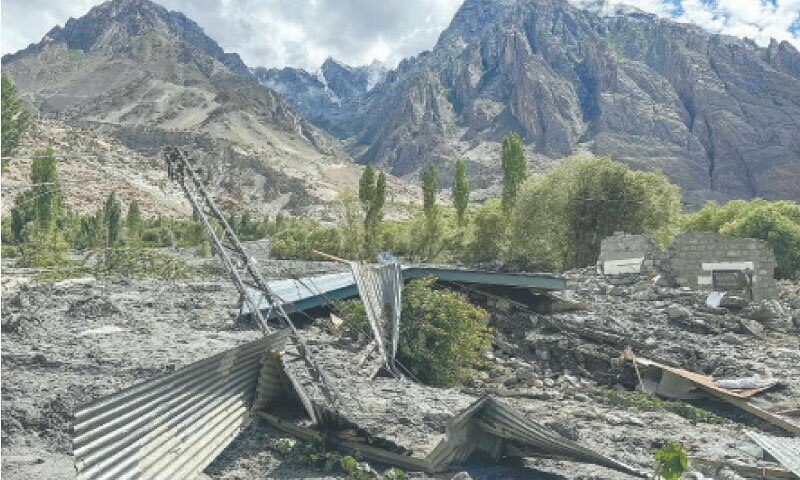• Fifth monsoon spell to hit Punjab; urban flooding feared
• Landslides may block roads in Murree, Galiyat, GB, AJK
• Karakoram Highway blocked again; tourists evacuated via C-130 flights
RAWALPINDI / LAHORE / GILGIT: The Pakistan Meteorological Department (PMD) has forecast another spell of monsoon rains across the country from July 29 to 31, urging provincial and district administrations to take precautionary measures.
According to the Met Office, weak monsoon currents are continuously penetrating the upper and central parts of the country and are likely to intensify next week. A westerly wave is expected to approach on July 29.
Rain accompanied by wind and isolated heavy showers is expected in Azad Jammu and Kashmir (including Neelum Valley, Muzaffarabad, Rawalakot, Poonch, Hattian, Bagh, Haveli, Sudhanoti, Kotli, Bhimber, Mirpur) and Gilgit-Baltistan (Diamer, Astore, Ghizer, Skardu, Hunza, Gilgit, Ghanche, Shigar) from July 27 to 31 with occasional gaps.
In Khyber Pakhtunkhwa, rain and thundershowers are forecast from July 28 to 31 for several districts, including Dir, Chitral, Swat, Kohistan, Shangla, Battagram, Mansehra, Abbottabad, Haripur, Buner, Malakand, Bajaur, Mohmand, Khyber, Orakzai, Kurram, Kohat, Peshawar, Charsadda, Nowshera, Mardan, Swabi and Dera Ismail Khan.
In Punjab and Islamabad, rain with scattered heavy showers is expected in Rawalpindi, Islamabad, Murree, Galiyat, Lahore, Gujranwala, Faisalabad and several other cities between July 28 and 31. Southern Punjab, including DG Khan, Multan and Bahawalpur, will see similar weather from July 29 to 31.
In Balochistan, rain and thundershowers with isolated heavy falls are expected in the north-eastern and southern districts from the night of July 29 to 31 July, including Barkhan, Musakhel, Loralai, Sibbi, Dera Bugti, Lasbela, Awaran, Khuzdar, Quetta, Zhob, Qilla Saifullah, Qila Abdullah, Ziarat and Kalat.
In Sindh, mainly hot and humid weather will prevail, but rain and thunder showers are expected in several parts, including Tharparkar, Umerkot, Dadu, Larkana and Sukkur, on July 30 and 31.
The PMD warned of potential flash floods in hilly streams of KP, northeast Balochistan, northeast Punjab and Kashmir from July 29 to 31. Urban flooding is likely in low-lying areas of Islamabad, Rawalpindi, Gujranwala, Lahore and Sialkot from July 28 (night) to July 31.
Landslides and mudslides may block roads in hilly areas of Khyber Pakhtunkhwa, Gilgit-Baltistan, Murree, Galiyat and Kashmir during the forecast period.
Fifth monsoon spell
In a joint advisory, the Provincial Disaster Management Authority (PDMA) of Punjab and the PMD forecast the fifth spell of monsoon rains in the province for the upcoming week.
Rain, wind and thundershowers with scattered heavy falls are expected in Lahore, Rawalpindi, Faisalabad and several other districts, while southern Punjab will receive rainfall between July 29 and 31.
PDMA Director General Irfan Ali Kathia ordered all commissioners and deputy commissioners to remain alert and complete precautionary measures. Civil defence, rescue services and related departments have been instructed to ensure preparedness.
He warned of possible landslides in Murree and Galiyat and damage to mud houses and weak structures. He also urged citizens to avoid unnecessary travel, refrain from crossing flooded roads and stay away from electrical infrastructure.
According to a PDMA fact sheet, Punjab witnessed rainfall in many parts over the last 24 hours, with Multan receiving 117mm, Lahore 43mm, Sheikhupura 37mm, Hafizabad 15mm, Okara 13mm and Sahiwal 12mm.
Moreover, 10 people were injured due to roof collapses in the last 12 hours. However, there was no loss of life due to accidents caused by rain in the last 24 hours.
The fact sheet also revealed 54 per cent water storage in Mangla Dam, 79pc in Tarbela and medium-level flooding in the Indus River at Chashma and Taunsa.
The flow of water in the Chenab, Ravi, Jhelum and Sutlej rivers is currently at normal levels.
The Punjab government has banned bathing in rivers, canals and storm drains, warning of strict action against violators.
GB faces climate emergency
Meanwhile, the Gilgit-Baltistan government said on Friday that the region is in the grip of severe climate change impacts, as floods triggered by melting glaciers and cloudbursts continue to cause widespread devastation.
People in several areas faced shortages of drinking and irrigation water, electricity, internet, telephone services and road access, as floods, landslides and soil erosion damaged roads, water channels, irrigation systems, power infrastructure and optical fibre networks.
In a media briefing, GB Chief Secretary Abrar Ahmed Mirza confirmed that nine people, including two women and two children, have died since July 10, including eight in Diamer’s Babusar and Thor valleys and one in Astore.
He said many areas were cut off due to landslides and mudflows. The Karakoram Highway was blocked again at Chilas, after which C-130 flight operations were started to evacuate stranded tourists and patients to Islamabad. Four tourists were airlifted from Fairy Meadows near Nanga Parbat.
Floods destroyed 196 homes, damaged another 200 and swept away over 12km of roads, 26 bridges, 20 vehicles, agricultural land and other infrastructure, including water channels and communication lines.
Mr Mirza said relief efforts are underway, with tents, food and emergency supplies being delivered. He acknowledged the growing frequency of cloudbursts and glacier melt, attributing the disasters to climate change.
Special flights from Skardu and Gilgit to Islamabad have begun, with 135 people, including 80 tourists, flown out so far. Search operations are underway for 10 to 12 missing tourists in Babusar Valley.
The GB government asked citizens to follow travel advisories and announced plans to review early warning systems, including the UNDP-funded Glof-II project.
Published in Dawn, July 26th, 2025
